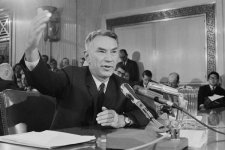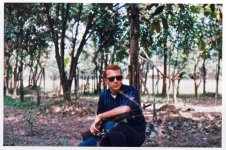"Edwin O. Reischauer: The Man Who Knew too Much (About Vietnam)," by Paul M. Bourke, who was a Japan specialist with the Australian Department of Foreign Affairs and Trade. The article is based on a paper he wrote while studying for a master in international affairs at Columbia University.
Few Americans viewed the Vietnam War in hindsight at the time, even after several years of fighting. People worried about where it was headed and whether it could be won. Few people were asking, yet, how it happened. Except Edwin O. Reischauer.
Throughout 1967, Reischauer, a professor of East Asian studies at Harvard and a former American ambassador to Japan, offered a rare and alternative analysis of Vietnam, the United States and Asia that has stood the test of time. Reischauer’s congressional testimony in 1967 and subsequent book, “Beyond Vietnam: The United States and Asia,” were all the more remarkable for being able to point to warnings he had made himself in the 1950s, about American involvement in Indochina, which had become a reality by 1967.
Born in Japan to Presbyterian missionary parents in 1910, Reischauer lived there until he was 16, and spoke Japanese fluently. He earned a doctorate in Asian studies from Harvard, where he subsequently taught Far East history and languages. From 1942 to 1945, he served in military intelligence at the War Department, and after the war with the Office of Far Eastern Affairs at the State Department.
He eventually went back to teaching at Harvard, but President John Kennedy pulled him back into government service as his ambassador to Japan, a job he held from 1961 to 1966 — a rare instance of placing an expert, rather than a political appointee, in a high-profile embassy.
While still at Harvard, Reischauer was openly critical of the Manichean dualism of communism versus the free world promoted fervently by Eisenhower’s Secretary of State, John Foster Dulles. In 1955, he published “Wanted: An Asian Policy,” in which he argued that the American stand against Communism in Korea could not be replicated across the rest of Asia. In fact, he wrote, the United States was already making the mistake of exporting that model to Southeast Asia, where it was supporting the French effort to reimpose colonial rule. “Indochina shows how absurdly wrong we are to battle Asian nationalism instead of aiding it,” he wrote. “The French failure to relinquish Indochina has put a heavy burden on the United States financially and could end by costing us dearly in lives.”
As ambassador, he also saw how America’s ill-conceived war in Vietnam was poisoning relations elsewhere in Asia, especially Japan. The Japanese public identified with the North Vietnamese as the subjects of American bombing and were concerned about Japan being drawn into a widening conflict between the United States and China.
Due in part to his increasing unwillingness to argue the case for America’s involvement in Vietnam to the Japanese, Reischauer resigned his post as ambassador in August 1966 and returned to Harvard, where he was free to express his misgivings about the Vietnam War in speeches and papers.
Reischauer was called to testify before the Senate Foreign Relations Committee in January 1967, just as its members were starting to voice their skepticism about the optimistic reports they received on Vietnam from the State Department and from the ambassador to South Vietnam, Ellsworth Bunker. Chaired by Senator J. William Fulbright, the committee was increasingly of the view that a negotiated settlement between North and South Vietnam, not an American military victory over North Vietnam, would be the most likely way for the country to end its military involvement.
As he was in “Wanted: An Asian Policy,” in his opening statement to the committee, the scholar and diplomat was unequivocal that the United States could and should have avoided getting bogged down in Vietnam. It should never have backed French attempts to reimpose colonial rule in Vietnam. It should never have assumed the French mantle in Vietnam after France was defeated by the Viet Minh in 1954. It should never have assumed that the political strategies used against Communism in Europe would work in developing countries in Asia.
“We have failed sometimes to understand the deeply rooted historic forces at work in Asia — anticolonialism, nationalism, the eagerness to wipe out past humiliations and the determination to advance rapidly without losing national identity,” Reischauer said, reading from his statement. This was a theme he developed more fully in his book “Beyond Vietnam,” restating his view that the United States had failed to harness Asian nationalism as the means of countering the Communists, who did harness nationalism to their ends in Vietnam and elsewhere in Asia.
Reischauer was not the only person in the political establishment making this point in 1967, but he was the only one who had been making it consistently for over a decade. It was a conclusion he had made in 1955, in “Wanted: An Asian Policy”: “Indochina is the classic case in which the Communists have utilized nationalism effectively against us.” It should have been the other way around. Looking back on the lessons of the Korean War and the danger signs he pointed to in 1955, Reischauer wrote in 1967: “Storm warnings might be up in Vietnam, but we were not prepared to recognize them. We continued to drift toward new catastrophes.”
Reischauer maintained that the United States should not be the agent of political, social or economic change in Asia but should provide economic support to those countries seeking self-determination and to develop themselves. As for the imposition of Communism across Asia by China or the Soviet Union, Reischauer did not see the project succeeding. He pointed to the Vietnamese as the people least likely to yield to the control of Communist China, with Vietnam’s long history of resisting Chinese domination likely to reassert itself if the Vietnamese nationalists won the war.
Surprisingly, Reischauer did not advocate a negotiated settlement or rapid withdrawal, at least not yet. The former was unrealistic; the latter would cause immense damage to American credibility. Having entered the fight and shaped it in its interest, America now had no choice but to see it through. In “Beyond Vietnam,” he argued that a negotiated settlement would be possible only if the Communists came to understand that the United States would stay the course in Vietnam. At the same time, the South Vietnamese government had to become better at serving the interests of its people. “It should be made clear that Saigon is in the process of achieving the very things for which some Viet Cong supporters feel they are fighting,” he suggested.
By early 1968, Reischauer had abandoned his belief that the United States should continue in Vietnam. Just before the Tet offensive, he joined with 10 other Harvard scholars in a telegram to President Lyndon Johnson urging that he enter into negotiations toward a settlement including the Vietcong. He also appeared again in front of Congress, before the House Asia and Pacific Affairs Subcommittee, in February 1968. In keeping with the views he expressed in 1955 and 1967, he told the subcommittee: “We have imagined ourselves as building a military dike against an on-rushing Communist wave. But there has been no wave. The real problem has proved to be the swampy economic and political terrain behind the dike we were attempting to raise. It was the local ground water that was undermining political structures. When this threatened to happen in Vietnam, the heavy machines we brought in to heighten the military dikes proved unmaneuverable in the swampy land and, by breaking through the thin crust of the bog, made it even less capable of maintaining the sagging political structure."
Reischauer was about as far from the culture of the antiwar movement as one could get, and yet his scholarly and professional insights did much to complement the multitudes filling the streets. Senator Fulbright, among others, listened to him closely; in March 1968, he read a statement from Reischauer and other Harvard scholars arguing against escalation during the televised testimony of Secretary of State Dean Rusk.
Reischauer was the rare breed of academic, one who, when the moment called, brought his estimable intellect to bear on the most important issue of the day. It says much about the state of American politics at the time that, until it was too late, too few people listened.
 Edwin O. Reischauer testifying about the Vietnam War at a Senate hearing in 1967
Edwin O. Reischauer testifying about the Vietnam War at a Senate hearing in 1967



